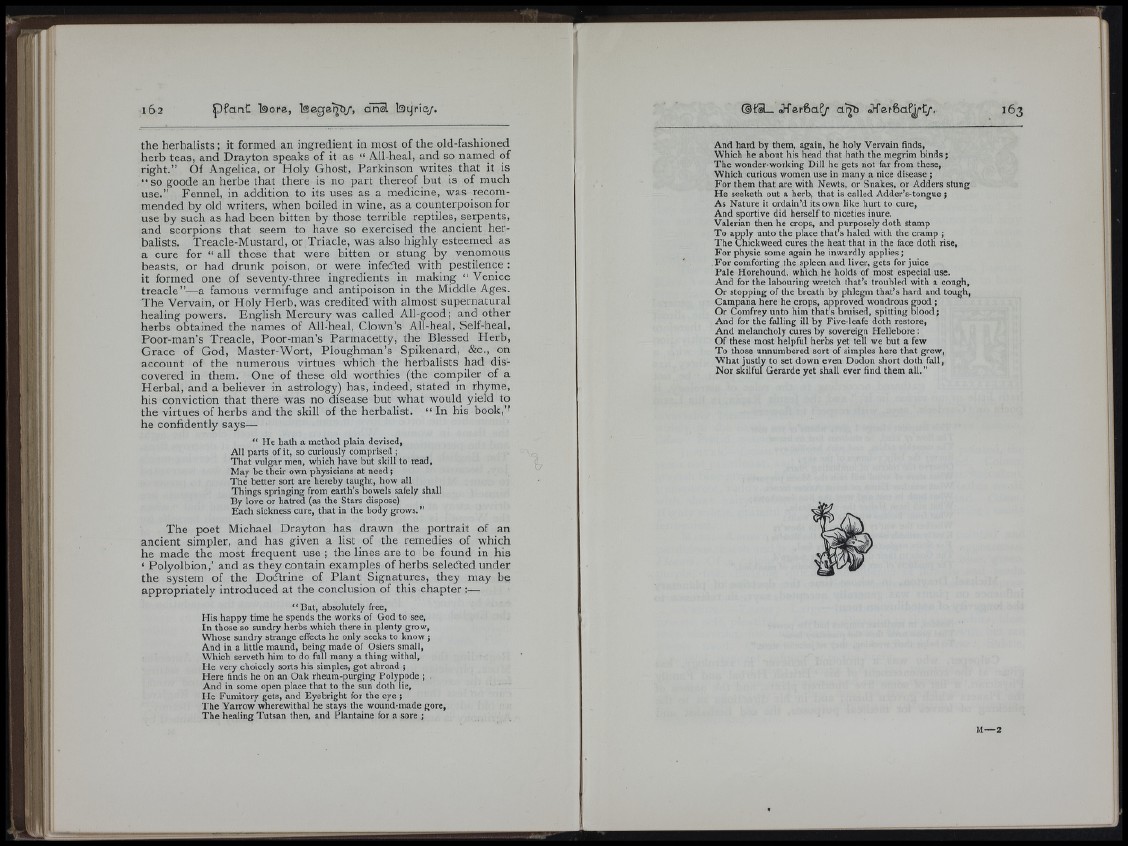
'1
i l
i’l ^
'4
1 i 1'
( .
. ill
I !
p F a n t T^ore, I s e g e i J / , oriel b ijn c / .
the herbalists; it formed an ingredient in most of the old-fashioned
herb teas, and Drayton speaks of it as “ All-heal, and so named of
right.” Of Angelica, or Holy Ghost, Parkinson writes that it is
“ so goode an herbe that there is no part thereof but is of much
use.” Fennel, in addition to its uses as a medicine, was recommended
by old writers, when boiled in wine, as a counterpoison for
use by such as had been bitten by those terrible reptiles, serpents,
and scorpions that seem to have so exercised the ancient herbalists.
Treacle-Mustard, or Triacle, was also highly esteemed as
a cure for “ all those that were bitten or stung by venomous
beasts, or had drunk poison, or were infecfied with pestilence :
it formed one of seventy-three ingredients in making “ Venice
treacle”—a famous vermifuge and antipoison in the Middle Ages.
The Vervain, or Holy Herb, was credited with almost supernatural
healing powers. English Mercury was called All-good; and other
herbs obtained the names of All-heal, Clown’s All-heal, Self-heal,
Poor-man’s Treacle, Poor-man’s Parmacetty, the Blessed Herb,
Grace of God, Master-Wort, Ploughman’s Spikenard, &c., on
account of the numerous virtues which the herbalists had discovered
in them. One of these old worthies (the compiler of a
Herbal, and a believer in astrology) has, indeed, stated in rhyme,
his conviction that there was no disease but what would yield to
the virtues of herbs and the skill of the herbalist. “ In his book,’’
he confidently says—
“ He bath a method plain devised,
All parts of it, so curiously comprised ;
That vulgar men, which have but skill to read,
May be their own physicians at need;
The better sort are hereby taught, how all
Things springing from earth’s bowels safely shall
By love or hatred (as the Stars dispose)
Each sickness cure, that in the body grows.”
The poet Michael Drayton has drawn the portrait of an
ancient simpler, and has given a list of the remedies of which
he made the most frequent use ; the lines are to be found in his
‘ Polyolbion,’ and as they contain examples of herbs selecited under
the system of the Docitrine of Plant Signatures, they may be
appropriately introduced at the conclusion of this chapter;—
“ But, absolutely free.
His happy time he spends the works of God to see,
In those so sundry herbs which there in plenty grow,
Whose sundry strange effects he only seeks to know ;
And in a little maund, being made of Osiers small,
Which serveth him to do full many a thing withal,
He very choicely sorts his simples, got abroad ;
Here finds he on an Oak rheum-purging Polypode ;
And in some open place that to the sun doth lie,
He Fumitory gets, and Eyebright for the eye ;
The Yarrow wherewithal he stays the wound-made gore,
The healing Tutsan then, and Plantaine for a sore ;
163
And hard by them, again, he holy Vervain finds,
Which he about his head that hath the megrim binds;
The wonder-working Dill he gets not far from these,
Which curious women use in many a nice disease ;
For them that are with Newts, or Snakes, or Adders stung
He seeketh out a herb, that is called Adder’s-tongue ;
As Nature it ordain’d its own like hurt to cure,
And sportive did herself to niceties inure.
Valerian then he crops, and purposely doth stamp
To apply unto the place that’s haled with the cramp ;
The Chickweed cures the heat that in the face doth rise,
For physic some again he inwardly applies;
For comforting the spleen and liver, gets for juice
Pale Horehound. which he holds of most especial use.
And for the labouring wretch that’s troubled with a cough,
Or stopping of the breath by phlegm that’s hard and tough,
Campana here he crops, approved wondrous good ;
Or Comfrey unto him that s bruised, spitting blood;
And for the falling ill by Five-leafe doth restore,
And melancholy cures by sovereign Hellebore :
Of these most helpful herbs yet tell we but a few
To those unnumbered sort of simples here that grew,
What justly to set down even Dodon short doth fall.
Nor skilful Gerarde yet shall ever find them all.”
M—2